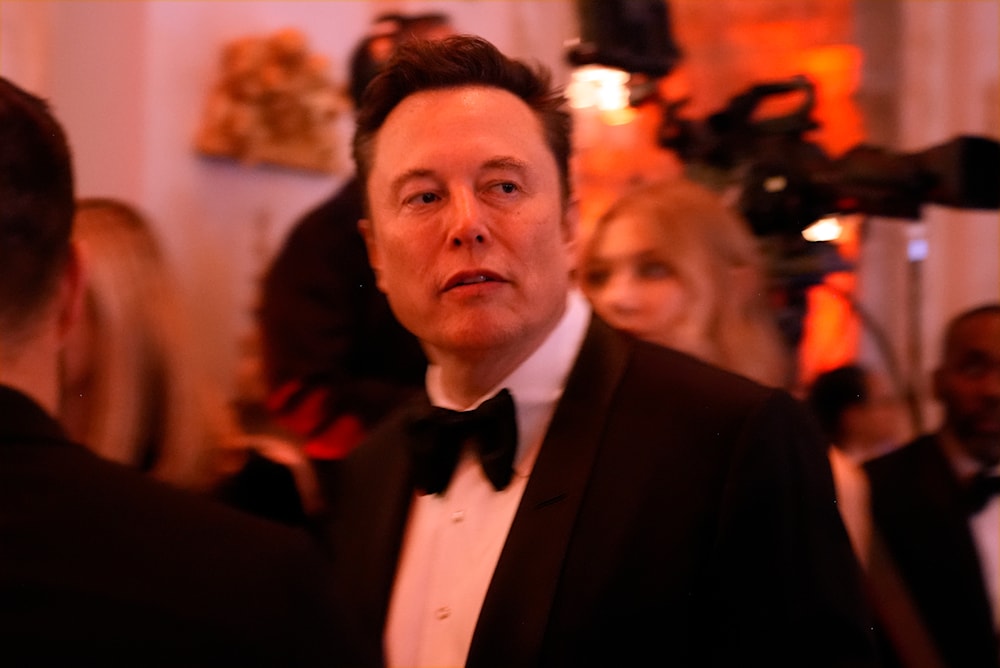Trump's Musk appointment puts social media neutrality at risk
Elon Musk's involvement in the government is viewed as a threat to social media neutrality due to his biased policies.
-

Elon Musk arrives before President-elect Donald Trump speaks during an America First Policy Institute gala at his Mar-a-Lago estate, on November 14, 2024, in Palm Beach, Fla. (AP)
Social media neutrality is under growing scrutiny, especially after President-elect Donald Trump appointed X platform owner Elon Musk to lead a new federal agency, the "Department of Government Efficiency."
Faik Tanrikulu, an associate professor of humanities at Istanbul Medipol University, told Anadolu that discussions around social media neutrality have intensified in recent years.
Tanrikulu explained that while Musk has relaxed some content restrictions on X in the name of free speech, he has also been criticized for allowing certain political views while suppressing others.
“For instance, while pro-Ukraine sentiment was (algorithmically) promoted during the Russia-Ukraine war, pro-Russia content was restricted on X, and similarly, during Israel’s attacks on Gaza, pro-Palestinian sentiment was restricted while pro-Israel posts were left untouched,” said Tanrikulu.
He added that “such interventions reinforced the perception of Musk, as his personal preferences on the platform’s financial interests overshadowed his (purported) neutrality and advocacy for freedom of speech."
Concerns about X credibility, neutrality
Tanrikulu pointed out that The Guardian's decision to cease posting on X after Musk's appointment to the new federal agency has reignited ongoing concerns about the platform's credibility and alleged neutrality.
The UK-based newspaper called X a "toxic media platform," accusing Musk of leveraging his influence to shape political discourse.
In a similar move, German soccer club SV Werder Bremen announced they were leaving X and encouraged their followers to join them on the rival platform Bluesky. The club cited the growing prevalence of hate speech masked as free speech on X as the main reason for their exit.
Read next: Musk says Wikipedia 'broken', citing alleged anti-Trump bias
Social media as a tool to incite chaos
Tanrikulu emphasized that social media platforms have revolutionized society by enabling people to participate in democracy and voice their criticisms of governments. However, he also warned that while these platforms can foster social change, they can equally contribute to chaos.
He pointed to the "Arab Spring" protests as an example of how social media can successfully mobilize large-scale movements against governments.
“Platforms like Facebook and Twitter played a crucial role in these protests and the rapid spread of mass movements against governments,” he said.
“However, we have seen in the UK the negative impacts of organizing masses to protest over social media, and how disinformation can result in actual danger,” he noted.
“A false report about the murder of three people at the hands of migrants spread rapidly online and led to protests and violence on the streets, and despite its falsehood, the effects of the chaos created by social media were felt and continue to be felt for a long time.”
Social media vs national security
Tanrikulu highlighted the growing tension between the neutrality and independence of social media platforms and the mounting pressure from governments. One example he cited is the US government's stance on the Chinese app TikTok.
The US has made multiple attempts to ban or regulate TikTok, citing concerns that it poses a national security threat due to the alleged sharing of user data with the Chinese government.
“A complete ban on TikTok was on the agenda during Trump’s first term, and while the Biden administration demanded strict regulations on TikTok’s activities in the country, it made it clear that the US is taking a tougher stance against social media platforms it can’t control,” he said.
Tanrikulu also noted that France has taken action against Telegram, the encrypted messaging app, accusing it of being used by criminals and terrorists.
“Telegram’s end-to-end encryption has been criticized for allegedly platforming criminal activity, and these allegations, coupled with the terrorist attacks in Paris, in which Telegram was alleged to have been used to organize, France was prompted to pressure the platform,” he said.
He explained that China has adopted a retaliatory approach by banning Western platforms like Facebook, X, Instagram, and YouTube, and replacing them with domestic alternatives to safeguard its national and cultural sovereignty.
Tanrikulu emphasized that these examples illustrate the growing pressure on social media platforms from governments seeking control. While such efforts are often justified as protecting freedom of speech and user privacy, countries sometimes intervene, citing national security concerns.
“This war (between countries for control and platforms to decide their own operations) often puts both the rights of users and freedom to access information at risk,” he said.
He concluded that although social media platforms claim to champion freedom of speech and democracy, they often prioritize their own financial and ideological interests.

 5 Min Read
5 Min Read








